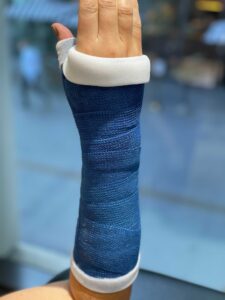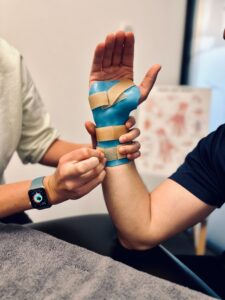casting & splinting services
casting / splinting Overview
Casting is a very common non-surgical option for injuries to your bones and soft tissues. Casting is a simple process that allows for complete immobilisation of the limb to encourage healing. While the healing time of a fracture varies from patient to patient, the average time that a cast stays on is about six weeks.
All of the practitioners at Barangaroo Physio are qualified to both apply and remove fibreglass casts. We also use waterproof liners so that you can swim and shower without worrying about damaging the cast.
Our team offer both waterproof and non-waterproof options depending on your specific needs.

SPLINTING OVERVIEW
Some of the more common splints we make are for injuries such as:
– Mallet finger
– Thumb Osteoarthritis
– Carpel Tunnel Syndrome
– Volar Plate Injuries
– Wrist and Finger Fractures
Our splints can me re moulded and adjusted over time such as when the swelling decreases. Custom made splints allow us to offload the injured area whilst enabling movement in other parts of the arm, hand or wrist.

Our team provides casting and splinting services for the upper limb. If you suspect that you have broken a bone, we can easily refer you to GPs or scanning services in the area.
Our visiting hand surgeon is Dr Lianne Bissell who consults at BOSIC every Tuesday. When you book a casting application with Barangaroo Physio, we will remove the cast for free.
FAQs
Tennis elbow is an injury that involves the common extensor tendon situated at the lateral (outside) part of your elbow. This common tendon extends into the muscles that extend the wrist (extensor carpi radialis brevis (ECRB) and longus, extensor digitorum, extensor digiti minimi, and extensor carpi ulnaris).
This injury is an overuse injury, wherein the tendon is not strong enough to handle the load and gets overloaded, irritating the tendon and ultimately causing pain.
In this interview with Principal Physiotherapist, Sam Davison, we learn some of her top tips from recovering from a knee injury. Whether you have sustained an acute injury or are dealing with chronic pain, Sam’s insight can help you explore options that you may not have considered before.
Many people get diagnosed with sciatic pain but do they know what sciatic pain really is? The words “sciatic pain” and “sciatica” get passed on to many of our patients by health professionals but what do these words mean?
Principal Physio, Sam Davison, discusses her recent knee injury while skiing. She gives her top recommendations for recovering post- ACL surgery,
